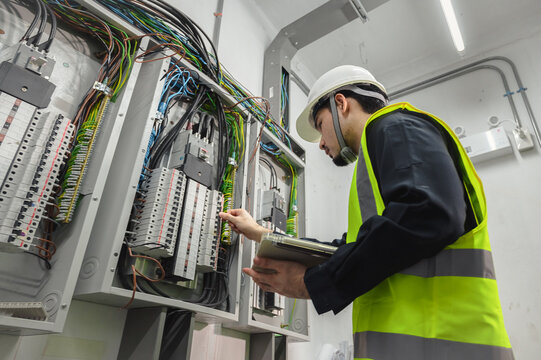Importance of Electrical Certificates: What the Law Says

- landlordcertificatechecks.co.uk
- +442046006545
When was the last time you flicked a switch and didn’t think twice about what happens next? Electricity is woven into the fabric of our daily lives, powering everything from our morning coffee maker to sophisticated smart home technologies. Yet, behind this seamless convenience lies a critical aspect that often gets overlooked: electrical safety compliance. Enter Electrical Installation Condition Reports (EICRs) and other electrical certificates — the unsung heroes of safe wiring and installations! In this blog post, we’ll unravel why these official documents are not just red tape but essential safeguards against potential hazards. From legal requirements to peace of mind for homeowners and tenants alike, join us as we illuminate what the law really says about electrical certificates and why they matter more than ever in today’s electrified world. Whether you’re a homeowner, landlord, or simply someone who wants to understand their rights and responsibilities when it comes to electricity usage at home—this information is crucial for keeping your environment safe!
Introduction to Electrical Certificates
When it comes to electrical work, safety should always be a top priority. Whether you’re a homeowner, landlord, or business owner, understanding the importance of electrical certificates is essential. These documents not only ensure that your electrical installations meet legal standards but also protect you and those around you from potential hazards.
But what exactly are these certificates? And why do they matter? In this blog post, we’ll dive into the world of electrical certificates and explore their significance in maintaining safe living and working environments. From grasping legal requirements to knowing when these certifications come into play—let’s unravel everything there is to know about keeping your property electrically compliant.
Understanding the Law and Electrical Certificates
Electrical certificates play a crucial role in ensuring safety and compliance with legal standards. The law mandates that any electrical work must meet specific regulations, which vary by region. These rules are designed to protect both property and lives from the hazards associated with faulty wiring.
Understanding these legal requirements is essential for homeowners, landlords, and contractors alike. Compliance not only safeguards individuals but also prevents potential liabilities stemming from accidents or insurance claims.
Regulatory bodies often set out clear guidelines on who can perform electrical installations and how they should be documented. Failure to adhere to these laws can lead to significant consequences, including fines or enforced repairs.
Each type of certificate serves a unique purpose within the framework of electrical safety legislation. Familiarizing yourself with these distinctions helps ensure your installations are compliant from the outset.
Is it a Legal Requirement to Have an Electrical Certificate?
Understanding whether an electrical certificate is legally required can be a bit complex. The law varies depending on where you live, but many regions require certain types of certificates to ensure safety and compliance.
For instance, in the UK, any new electrical installation or significant changes to existing systems typically must be certified by a qualified electrician. This helps protect homeowners from potential hazards stemming from faulty wiring.
Landlords also have specific obligations. They are often mandated to obtain Electrical Installation Condition Reports (EICRs) for rental properties every five years or whenever tenants change.
Failing to secure the necessary certifications can lead not only to fines but also serious safety risks. It’s essential for both residential and commercial property owners to stay informed about local regulations regarding electrical work and certification requirements.
Types of Electrical Certificates
Electrical certificates come in various forms, each serving a specific purpose.
Installation Certificate
An Installation Certificate is issued for newly completed electrical installations. It confirms that the work complies with safety standards and regulations.
When an electrician completes an installation, they issue this certificate. This process ensures that every connection, circuit, and fitting has been thoroughly inspected.
The certificate includes crucial details such as the location of the installation, description of work done, and any deviations from standard practices. Clients receive peace of mind knowing their electrical system is safe for use.
It’s essential to retain this document for future reference. In case of property sales or insurance claims, having an Installation Certificate can simplify processes significantly.
Minor Electrical Installation Works Certificate
The Minor Electrical Installation Works Certificate is essential for smaller electrical jobs. It covers changes that don’t require a full installation certificate, such as adding new sockets or replacing light fixtures.
This certificate ensures the work complies with safety standards. It shows that a qualified electrician has completed the task correctly and safely.
Obtaining this certificate provides peace of mind to both homeowners and tenants. It assures them that all modifications meet legal requirements.
Moreover, having this documentation can be beneficial when selling your property or securing insurance. Without it, you may face complications down the line.
In essence, even minor works deserve proper certification to avoid future headaches and ensure safety throughout your home.
Electrical Installation Condition Report (EICR)
An Electrical Installation Condition Report (EICR) is a detailed assessment of the safety and condition of an electrical installation. It highlights any potential hazards, ensuring that your property remains safe for occupants.
Qualified electricians conduct these inspections at regular intervals. They check everything from wiring to the overall functionality of circuits. The report categorizes findings based on their urgency, which helps prioritize necessary repairs or upgrades.
The EICR isn’t just about compliance; it also offers peace of mind. Knowing your electrical systems are in good shape reduces risks like fire or electric shocks.
Property owners should be proactive about obtaining this report, especially if the installation hasn’t been assessed in years. Regular checks can unveil issues before they become serious problems, safeguarding both lives and investments.
Periodic Inspection Report (PIR)
A Periodic Inspection Report (PIR) is essential for assessing the safety and condition of electrical installations over time. This report evaluates how well your system complies with current regulations.
During a PIR, qualified electricians conduct thorough checks on wiring, circuits, and earthing systems. They look for potential hazards such as wear and tear or outdated components that could lead to accidents.
The results are documented in detail. If issues arise, recommendations for repairs or upgrades will be included. This ensures that any risks are addressed promptly.
Homeowners and landlords should prioritize these inspections every few years. Regular testing not only enhances safety but also helps maintain property value while ensuring compliance with legal requirements.
When are Electrical Certificates Required?
Electrical certificates are essential in various situations. New installations typically require a certificate to ensure compliance with safety standards. This documentation confirms that the work meets legal regulations and is safe for use.
When changes or additions are made to existing electrical systems, obtaining a new certificate is crucial. Modifications can alter the integrity of previous installations, making it necessary to verify their safety again.
Rental properties present another scenario where electrical certificates come into play. Landlords must ensure that their property’s wiring meets current standards before tenants move in. Regular inspections and updated certificates help maintain safety and protect both property owners and occupants alike.
Knowing when these certifications are required can save you from potential hazards down the line. Being proactive about electrical compliance not only enhances safety but also avoids penalties related to non-compliance.
New Installations
When you’re setting up a new electrical installation, obtaining an Electrical Certificate is crucial. This document confirms that the work has been completed according to safety standards and regulations.
A qualified electrician will conduct thorough inspections during installation. They ensure all components are properly fitted and functioning as intended. This process not only protects you but also everyone who uses the electricity in your space.
Without this certificate, you may face serious risks. Uncertified installations can lead to accidents or malfunctions, jeopardizing both safety and property.
Moreover, if you plan to sell your property in the future, having a valid Electrical Certificate adds significant value. Prospective buyers often seek verification of safety compliance before making any offers.
In short, prioritizing certification for new installations isn’t just about following the law; it’s about safeguarding lives and investments alike.
Changes or Additions to Existing Installations
When you make changes or additions to your existing electrical installations, it’s crucial to ensure everything meets safety standards. This process often requires obtaining an electrical certificate.
Whether you’re upgrading a circuit or adding new lighting fixtures, these modifications can affect the overall system’s integrity. An updated certificate verifies that all work is compliant with current regulations.
Neglecting to get this certification could lead to serious safety risks and potential legal consequences. Insurers may also deny claims if something goes wrong due to unverified work.
Involving a qualified electrician ensures that any alterations are not only safe but also properly documented. This protects both the property owner and future occupants from unforeseen hazards related to faulty wiring or outdated systems.
Rental Properties
When it comes to rental properties, electrical safety cannot be overlooked. Landlords have a legal obligation to ensure that any electrical installations are safe and compliant with regulations. This includes obtaining the necessary electrical certificates.
Tenants deserve peace of mind regarding their living conditions. A valid electrical certificate demonstrates that the property has been inspected and meets safety standards.
It’s also beneficial for landlords. Having up-to-date certificates can help attract potential tenants, showcasing a commitment to safety and compliance.
In addition, many local laws require regular inspections for rental properties. Failing to provide these certificates may lead to fines or legal issues down the line.
Being proactive about electrical certifications not only protects your investment but also fosters trust with tenants. Their safety should always be a top priority in any rental agreement.
Consequences of Not Having an Electrical Certificate
Neglecting to obtain an electrical certificate can lead to serious repercussions. For starters, it may void your home insurance. If there’s an incident linked to electrical faults, insurers could refuse any claims.
Furthermore, not having a certificate might result in hefty fines from local authorities. Many regions are strict about compliance with electrical safety regulations.
Safety risks also come into play. Without proper certification, you may not be aware of dangerous wiring or faulty installations lurking within your property. This oversight can put lives at risk.
If you’re planning on selling your home, the absence of an electrical certificate could deter potential buyers or lower the property’s value significantly. Buyers often seek reassurance that their future home is safe and compliant with current standards.
Lastly, you might face legal complications if something goes wrong during a DIY project or unqualified installation without certification backing it up.
How to Obtain an Electrical Certificate?
Obtaining an electrical certificate is a crucial step in ensuring the safety and legality of your electrical installations. To start, hiring a qualified electrician is often the best route. Look for professionals who are registered and have relevant certifications. They can assess your installation and issue the appropriate certificate based on their findings.
If you’re feeling adventurous, there’s also a DIY option available. However, this path comes with significant risks. Electrical work requires expertise to avoid hazards that could lead to accidents or fines.
Make sure you gather all necessary documentation before asking for a certificate. This will streamline the process and help ensure compliance with legal standards.
Whether you choose to hire someone or go it alone, prioritizing safety should always be at the forefront as you navigate obtaining your electrical certification.
Hiring a Qualified Electrician
When it comes to obtaining an electrical certificate, hiring a qualified electrician is crucial. They bring expertise and experience, ensuring that the work meets all safety standards.
A qualified electrician understands the legal requirements in your area. This knowledge helps prevent potential issues down the road. They can navigate complex regulations with ease.
Moreover, hiring a pro guarantees proper installation. Mistakes made during electrical work can lead to dangerous situations or costly repairs later on.
Look for electricians with relevant certifications and positive reviews from past clients. It’s also wise to check if they carry liability insurance; this protects both you and them in case of accidents.
In short, choosing a skilled professional not only saves time but also enhances safety within your home or property. A little research goes a long way when selecting someone you can trust with such an important task.
DIY Option
While some homeowners may feel tempted to take a DIY approach to electrical work, it’s crucial to tread carefully. Electrical installations and repairs require specific knowledge and skills that not everyone possesses.
If you’re considering tackling the job yourself, ensure you’re well-versed in local regulations and safety standards. A lack of expertise could lead to dangerous situations or even property damage.
Moreover, completing the work without proper certification can leave you vulnerable if something goes wrong down the line. Insurance claims might be denied if unqualified work is involved.
For many, hiring a qualified electrician is worth the investment. They have the training needed for safe practices and will issue an official certificate upon completion—something invaluable for both peace of mind and legal compliance.
Importance of Regularly Updating Electrical Certificates
Regularly updating electrical certificates is crucial for maintaining safety in your home or business. Over time, wear and tear can affect the integrity of electrical systems. An up-to-date certificate signals that everything is functioning properly.
Compliance with current regulations also plays a significant role. Electrical standards change as technology evolves, meaning what was safe years ago might not meet today’s requirements. Staying compliant protects you from potential legal issues.
Moreover, having updated certificates can enhance the value of your property. Prospective buyers or renters often look for assurance that installations are safe and compliant.
Finally, peace of mind cannot be overstated. Knowing that your electrical systems have been inspected regularly allows you to focus on other aspects of life without worry about hidden hazards lurking in outdated wiring.
Ensuring Safety
Safety is paramount when it comes to electrical installations. Faulty wiring or outdated systems can lead to hazards such as electric shocks, fires, and even fatalities. Regular inspections ensure that your electrical systems are functioning correctly and safely.
Each certificate acts as a verification of safety standards being met. When professionals conduct their assessments, they identify potential risks before they escalate into serious issues.
Having up-to-date electrical certificates reflects a commitment to maintaining safe environments for everyone—residents or employees alike. This proactive approach not only protects lives but also safeguards property from damage.
Moreover, insurance companies often require valid electrical certifications before processing claims related to fire or accidents caused by faulty wiring. Ensuring that you have the proper documentation means you’re taking responsibility for your environment’s safety and security.
Compliance with Regulations
Compliance with electrical regulations is not just a legal obligation; it’s a crucial aspect of maintaining safe living and working environments. By ensuring that your electrical systems are certified, you help protect yourself, your family, or your tenants from potential hazards.
Staying compliant means keeping up with changes in the law and adhering to best practices in safety standards. Regular inspections and updates to your electrical certificates can prevent minor issues from becoming major problems down the line.
Ultimately, having valid electrical certificates demonstrates due diligence on your part as a property owner or manager. It shows that you prioritize safety and compliance, fostering trust among those who occupy or utilize your space. This proactive approach not only mitigates risks but also enhances the overall value of your property by assuring current and prospective tenants of their safety.
Get Social
Recent Post
-
 Expert Fire Alarm Installation Services in the UK : Steps, Certificates, and Safety Checks Explained
Expert Fire Alarm Installation Services in the UK : Steps, Certificates, and Safety Checks Explained -
 Commercial EICR Inspections – Ensure Workplace Electrical Safety
Commercial EICR Inspections – Ensure Workplace Electrical Safety -
 Fire Safety Certificate in London – Quick and Affordable Process
Fire Safety Certificate in London – Quick and Affordable Process -
 Residential EICR Certificate – Secure Your Home
Residential EICR Certificate – Secure Your Home -
 Asbestos Management Survey: Key Steps to Keep Your Building Safe
Asbestos Management Survey: Key Steps to Keep Your Building Safe



